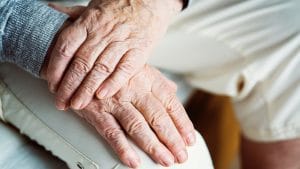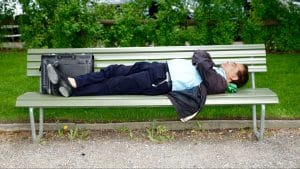Negative Effects of Sleep Deprivation on Your Health
written by / March 3, 2022

You’ve probably experienced some, if not most of the acute effects of sleep deprivation, like being all shades of tired, cranky, and achy. Unfortunately, the list doesn’t end there.
The overall harm that a lack of sleep has on our physical and mental health goes well beyond drowsiness. In fact, being short on sleep wreaks havoc in every system in our bodies.
Here, we’ll dive into what exactly happens when you don’t get your seven to nine hours of sleep. How severe, preventable, or reversible is sleep deprivation? Read below!
Quick Overview of the Effects of Sleep Deprivation
Systemic sleep loss is a common problem in modern society that affects most people at some point in their lives. The background for this issue is complicated, and insomnia stats show that almost 40 million US adults suffer from chronic sleeplessness.
The official world record for the longest wakefulness period is 264 hours or 11 days, although it has reportedly been broken in less documented attempts. Although decreased cognitive abilities and intense irritability were observed from the subject, Randy Gardner, long-lasting injuries haven’t been reported.
What Happens When You’re Sleep-Deprived?
The many signs and symptoms of sleeplessness can be grouped into two major categories:
- Effects on mental health and cognition
- Physical effects
That said, there are a few more specific categories of effects sleeplessness has on our everyday life. These are:
- Poor cognitive performance
- Drowsiness
- Mood changes and disorders
- Compromised immunity
- Metabolic disturbances
- Hormonal imbalance
- Increased risk of chronic conditions
- Low sex drive
However, you need to take into account that the short-term effects of sleep deprivation from, say, a night of lost sleep, are different from the effects of chronic sleeplessness.
So, while the consequences of chronic sleep debt are quite serious, the courageous people who have been subjected to acute extended sleep deprivation under medical supervision haven’t reported any long-term repercussions from their experiments. It is worth noting, however, that Randy Gardner did have insomnia later in life, nearly fifty years after achieving his momentous record.
Symptoms of Sleep Deprivation by Stages
24 Hours
After your first sleepless night, the mesolimbic brain system, which corresponds to the body’s reward system, is stimulated, increasing dopaminergic activity. This leads to the release of excess amounts of dopamine, causing the following—seemingly not too bad—symptoms:
- Euphoria
- Energy
- Cheerfulness
- Carelessness
- Enhanced libido
- Increased blood sugar
- Tension
36 Hours
One and a half a day after we’ve last slept, the body transitions into what many researchers view as one of the more advanced sleep deprivation stages. The brain starts to “shut down” by reducing activity in areas associated with action planning. This results in more impulsive and uncontrollable behavior. Symptoms also include:
- Exhaustion
- Slower reactions
- Short-term memory loss
- Nausea
- Learning difficulties
48 Hours
After two days of sleeplessness, the body loses its ability to metabolize enough glucose for energy. This is where sleep deprivation and nausea come together. This, in turn, takes a significant toll on the immune system, drastically decreasing its ability to defend the body.
- Extreme fatigue
- Drowsiness
- Increased appetite
- Irritability and mood changes
- Microsleep
72 Hours
By the third day of complete sleeplessness, a person starts to progressively lose contact with reality. Multiple microsleeps occur without us even noticing.
Those that have had this extreme experience know only too well that sleep deprivation and hallucinations go hand in hand. Other symptoms of severe sleep deprivation include:
- Severe cognitive impairment
- Losing contact with reality
- Increased heart rate
- Paranoia
- Hallucinations
- Feeling cold
When your body needs more sleep, its first reaction is gradually shutting down cognitive functions.
With the exception of a few physical effects, like various degrees of fatigue, nausea, and feeling cold, cognitive difficulties like memory, focus, decision-making, poor memory are the most prominent acute effects of sleeplessness.
The Cognitive Effects of Sleep Deprivation on the Brain
As we mentioned previously, the go-to mechanism that our body uses to protect itself from lack of sleep-induced damage is the “shutting off” thinking skills. These include a wide array of capacities such as memory, decision making, organizational skills, etc.
The bad news is that long-term exposure to sleeplessness can cause lasting changes in our cognitive performance. The following are the science-backed difficulties we encounter, i.e., the most common sleep deprivation effects on the brain:
Impaired Memory
REM sleep and Stage 3 of NREM sleep are indispensable for a process called consolidation of memory to occur.
During these stages of sleep, memories are stored “more deeply” in the parts of the brain in charge of long-term memories. This way, the brain becomes refreshed and ready to learn new things as soon as we open our eyes.
Memories can’t consolidate if you don’t sleep: Memory deficits occur because of structural changes in the synaptic connectivity induced by sleep loss. At least, this is what studies on the health effects of sleep deprivation in mice reveal. Scientists have every reason to believe that this is also true for humans.
Decision-Making and Adaptation Difficulty
It’s not only your physical reactions that slow down when you are tired, but your judgment as well. Your ability to make an adaptive decision in situations of uncertainty will result in a loss in effectiveness and inappropriate reactions, i.e., errors.
Inability to Focus
A shorter attention span is one of the most famous effects of sleep deprivation. Being this distracted means making more mistakes in everyday tasks, and can even be dangerous (e.g., driving or operating any machinery).
In fact, a significant portion of road accidents is caused by inattentiveness from sleep deprivation; this makes sleep deprivation potentially deadly.
Emotional Consequences
The psychological effects of sleep deprivation in scientific literature extend to your emotional response, as well.
It has been proven that sleep deprivation affects centers in the brain’s prefrontal cortex—the region responsible for impulse control, and purposeful behavior. When this cognitive modulation is weakened, especially in children, where this part of the cortex hasn’t even fully developed yet, the effects of sleep deprivation on the teenage brain include:
Resurging of Suppressed Memories and Emotions
Scientists are still pretty far from understanding the exact mechanisms through which people can suppress traumatic memories and keep intrusive thoughts at bay.
One thing is certain, however: When your brain is sleep-deprived, these mechanisms weaken, and memories and thoughts otherwise stowed away reappear. This is bad news for anyone who hasn’t had a perfectly trauma-free life, which is to say, practically everyone.
Increased Fear Response, Anxiety, and Paranoia
The mental effects of sleep deprivation are often most evident in your increased stress responses – everyone knows we’re jumpy when we’re not well-rested. This only gets worse the longer you deprive yourself of sleep: You might even start to perceive threats where there aren’t any.
Individuals lacking sleep have a stronger reaction to fear-inducing stimuli than when they are well-rested. Stress responses of this proportion lead to an increased risk of developing anxiety and paranoid thinking.
Mood Swings and Depression
Besides weaker learning capacity, depression is another of the most severe effects of sleep deprivation on college students and adolescents.
It’s unclear what processes lead to depression and other mood disorders. However, one thing is for sure—depressed people have altered circadian functioning. They show a certain desynchronization in the day-night patterns of the body, and this becomes both the cause and consequence of sleep deprivation and mood disorders.
To alleviate that, depression treatment often includes melatonin supplements, as the timed use of the sleep-inducing hormone can refresh a person’s internal clock. A young-adult-centered study showed that the effects of chronic sleep deprivation, including a decrease in positive feelings, were clearly visible when the subjects were deprived of just two hours of their usual sleep time.
Psychosis and Hallucination
As explained above, the longer you stay awake, the more you start losing touch with reality. What’s more, one study shows that what starts as simple sensory misperceptions can lead to hallucinations, and even to a condition resembling psychosis.
Change in Eating Habits
One of the best-documented sleep deprivation effects on behavior concerns food intake. Feeding is driven by homeostatic (i.e., biological), emotional, cognitive, social, and environmental factors. As sleeping affects all these aspects of our functioning, it stands to reason that it also influences one’s diet.
People who don’t sleep enough are less likely to refrain from high-calorie foods, especially if the deprivation is prolonged. This makes sense, as high-calorie foods offer the biggest bursts of energy. However, since our metabolism doesn’t work properly when we’re underslept, the detrimental consequences of overeating are even worse in this case.
Short-Term Physical Symptoms of Sleep Deprivation
Blurred Vision
Sometimes a lack of sleep can lead to immediate physical symptoms. These include impaired peripheral vision, double vision (diplopia), and blurred vision.
In fact, the longer you stay awake, the more visual difficulties you’ll experience and the more likely you are to experience hallucinations, as mentioned above.
Skin Problems
One of the short-term effects of sleep deprivation is bad skin. According to a study by the University of Wisconsin, poor sleep quality is strongly correlated with chronic skin problems.
Similar studies also demonstrated that, when the skin is damaged by the sun or other factors, it doesn’t recover as well in sleep-deprived people. Furthermore, their skin shows more signs of aging.
Nocturia
Another of the less known sleep deprivation effects on the brain and body is that the nighttime slowdown of urine production doesn’t kick in. This leads to the continued production of urine at night.
While this condition in children usually leads to wetting the bed, adults experience so-called nocturia—the condition of waking up often with a need to urinate. This, in turn, detracts from their resting time, and the cycle continues.
Sleep Deprivation Effects on Physical Health
Sleep can be both a remedy and a health risk. Statistically, people sleeping between seven and nine hours a day live longer. Anything below or above this time bracket carries health risks.
Studies show that less than six hours of sleep increases the risk of developing heart disease or depression, and even the threat of brain damage can be a concern. Conversely, more than 10 to 11 hours of sleep daily can enhance the risk of cardiovascular disease and diabetes. However, one of the factors modulating the latter finding is that people who sleep longer often sleep in shorter bursts, resulting in low-quality rest similar to that of a person who doesn’t sleep for long enough.
As you can see, the answer to the question “What happens to your body when you don’t get enough sleep?” is long and complicated. Let’s see what else there is.
Pregnancy Sleep Deprivation Is a Big Risk
Sleep is always essential, but it can be even more important when pregnant. A study involving 3,608 pregnant women showed that sleep deprivation could result in higher blood pressure in newborns, and increased risk of childhood obesity. Unfortunately, pregnant women often have insomnia and trouble finding a comfortable position to sleep in. One way to help this is using specialized pregnancy pillows.
Increased Risk of Chronic Diseases
Long-term effects of sleep deprivation can be summed up as an increased risk of developing the most common chronic diseases.
Cancer
There is a research-based link between insufficient sleep and the risk of cancer. In particular, people with disturbances in their circadian rhythm and biological clock (due to working long shifts, for example) have a higher risk of developing cancer.
A publication in the International Cancer Journal reported a link between women’s irregular work schedules and the likelihood of breast cancer, especially in women who worked at night before their first pregnancy.
Cardiovascular Diseases (CVDs)
One of the most dangerous side effects of sleep deprivation is increased blood pressure. This is the leading risk factor for all CVDs. But that’s not all!
People who are sleep-deprived often experience irregular heart rhythms. Sleepless nights boost the concentration of the body’s C-reactive protein, which causes a state of inflammation in the body.
All these are a recipe for heart disease and similar cardiovascular health disturbances.
Diabetes
Even though sleep deprivation and death are not directly correlated, the development of serious chronic conditions like diabetes is scary enough. It is evident from various studies that both the extended hours of sleep and shorter length are related to a higher risk of diabetes.
Sleep deprivation leads to the development of diabetes in two different ways. Secondly, a lack of sleep causes dysfunction of the insulin-producing cells. If this dysfunction is continued, the cells become insulin-resistant, meaning that they need more insulin to use the sugar in the blood. Combined with increased stress hormones, sleep deprivation can play a significant role in triggering diabetes.
Hormonal Imbalance
Hormonal imbalance is another of the physical effects of sleep deprivation. There are several hormonal imbalance symptoms that are a direct consequence of loss of sleep.
Increased Appetite
Insufficient sleep leads to dysregulation in the metabolic hormones leptin and ghrelin. Leptin is an adipocytokine that signals the brain (the appetite control center located in the hypothalamus) our body is sated.
Conversely, ghrelin is an appetite-stimulating hormone that sends signals from the stomach to the brain to heighten our appetite. One of the sleep deprivation symptoms is increased ghrelin activity. What’s more, so-called “short sleepers” have lower leptin levels.
This means that sleep deprivation affects the availability of leptin to accurately account for an energy imbalance. A reduction of leptin availability due to insufficient sleep is associated with an increased appetite for sweet, salty, and carbohydrate-rich foods.
Though not directly studying sleep deprivation, other articles showcase a similar dose-dependent reduction in hunger and food consumption when greater amounts of leptin are administered into the blood.
As previously mentioned, it’s perfectly logical that the less that someone sleeps, the more they need to increase their food intake, as the body tries to compensate for the energy deficit otherwise taken care of by sleeping.
The Causes of Sleep Deprivation
Anything from an ill-adapted bed to illness and sleep disturbances can cause sleep deprivation. For the working population, the most common cause of sleep deprivation is stress-induced insomnia.
Chronic insomnia can be a symptom of several diseases. In these cases, you should consider seeking immediate medical advice. Whatever the cause, given the potential effects of sleep deprivation on your health, prompt action is needed for you to preserve your well-being.
Other sleep deprivation factors include:
- Aging
- Workload
- Chronic conditions
- Certain medication
- Bad sleep environment
- Stressful events
- Sleep disturbances
On the other hand, university workload is the most common cause of sleep loss in college, leading to impaired learning and other detrimental effects of sleep deprivation on students.
How to Prevent Sleep Deprivation
- Eat a light dinner and don’t have food and drinks within two hours of going to bed.
- No alcohol at bedtime. Although alcohol sometimes makes falling asleep easier, it is also the cause of frequent insomnia.
- Wear socks in bed. According to science, warmer feet help you fall asleep faster.
- Reduce caffeine use. Excessive caffeine consumption, especially in the afternoon, could easily be the reason you stay up at night.
- Take a short daytime nap (but no more than 30 minutes) if you’re still wondering how to prevent sleep deprivation. This won’t interfere with your sleep at night, but it will improve your memory, alertness, and work capacity.
- Stay active, but not right before sleep. According to research, people who train regularly sleep significantly better. It doesn’t require much – just add half an hour of physical exercise during the day to improve your sleep.
- Maintain a steady daily routine. When you have trouble sleeping, it’s a good idea to follow the same pattern, even on weekends. You’ll keep the symptoms of sleep deprivation at bay if you stick to a fixed sleep schedule.
- Consider meditation. Try to imagine that you’re in a quiet, lovely place to help your body relax and keep still to calm the mind down.
- Take a warm bath at bedtime. This might help you fall asleep more quickly, as well as sleep more deeply. First of all, a warm bath helps relax our muscles, and when we come out of the tub, our body temperature begins to fall, imitating the natural process our body goes through before falling asleep.
- If you’ve had a stressful event, talk it out. This can be beneficial both for sleeping better and preventing the social effects of sleep deprivation, like loneliness.
- Get the right amount of sunlight. Early in the morning, it helps to feel the sun’s rays for at least 15 minutes. This helps regulate your body’s biological clock.
Sleep in a Pleasant Environment
Creating a good sleep environment can mean the difference between a good night’s sleep and severe sleep deprivation. These tips can help you create a soothing sleep environment:
- Sleep in a dark room. When we talk about complex sleep deprivation treatment, we have to remember that light is a signal for the brain to stay awake and alert. Thus, any sources of light before bedtime—phones, TVs, laptops, etc.—send alertness signals. Even a digital clock’s light can prevent you from falling asleep. Turn off every electronic device and pull the curtains over your windows one hour before going to bed. If you can’t block the irritating light, consider using a sleep mask.
- The right temperature is one of the most effective sleep deprivation solutions. A room that is too hot or too cold may cause poor sleep. The ideal sleep temperature is between 60 and 67°F (16 – 19°C) So, don’t hesitate to add an electric blanket to your winter sleep routine.
- Keep your room quiet. If you have trouble falling asleep due to unpleasant or irritating sounds like a snoring partner or a ticking clock, use earplugs.
- Add in some pleasant smells. Soothing scents might help us fall asleep faster.
- The bed is just for sleeping. Don’t work on your computer or scroll social media in it if you want to alleviate your sleep deprivation symptoms.
- Get a good mattress. Sometimes the reason you can’t fall asleep is right under you. Whether it has lost its softness or is too short, experts recommend changing your mattress every 5 to 10 years.
- Get a new pillow. Finding the right pillow, just like a mattress, can solve sleep problems and prevent the adverse effects of sleep deprivation. Choose your pillow according to your most common sleep position or health condition. For example, if you suffer from neck pain, you should try a quality cervical pillow.
Conclusion
Coping with sleep deprivation usually requires a broad approach that takes multiple factors into account. To mitigate the effects of this condition, it’s best to try to compensate for the unpleasant consequences as much as we can.
After all, sleep deprivation tends to have a massive impact on a person’s physical and mental health and quality of life.
FAQs
Can you catch up on lost sleep?
When you’re sleep-deprived, you’d expect that getting extra sleep would help make things better. However, a recent study from Harvard Medical School demonstrated that this isn’t the case. The findings concluded that it’s nearly impossible to “catch up on sleep.”
Even when you sleep extra hours to compensate for not having enough rest, there’s no real way to recoup. This is especially bad news for shift workers such as doctors, truckers, and law enforcement officers.
Can lack of sleep make you crazy?
It’s well-known that people with mental health issues, such as depression, anxiety, paranoia, bipolar disorder, and attention-deficit hyperactivity disorder, have sleep problems.
However, research suggests that this could also work the other way around. It seems that persistent sleep deprivation may cause and exacerbate several common mental illnesses. This is why treatments for many of these conditions include melatonin (sleep hormone) supplements.
What happens to your brain when you don’t get enough sleep?
Studies suggest that the brain is the first organ to react to the lack of sleep. Sleep deprivation leads to sluggish and erroneous cognitive functions, memory impairment, and even structural changes, as brain cells become overworked.
Plus, more complex functions, like multitasking, creative thinking, problem-solving, and decision-making, all go down the drain when you’re sleep-deprived.
What are the long-term effects of sleep deprivation?
Continuous lack of sleep is detrimental to the overall health of both body and mind. The most dangerous consequence is the increased risk of developing:
- Cognitive impairment
- Breast cancer
- Diabetes
- Obesity
- Heart disease
- Anxiety
- Depression
Can lack of sleep cause permanent brain damage?
Recent studies show that chronic sleep deprivation can, in fact, lead to brain damage. Although it might not be the drastic kind of problem you’re imagining, lack of sleep in mice causes the dying out of overworked brain cells (neurons).
In a recent study, repetitive sleep loss led to the decay of one-quarter of the neurons responsible for alertness in mice, and scientists believe this is also the case with humans.
How is the body affected by sleep deprivation?
Sleep is essential for the normal function and regulation of biochemical processes in our bodies. When we’re sleep-deprived, our bodies react in a way that urges us to save our energy, seek more food, and stick to simple cognitive tasks.
That said, the consequences of lack of sleep depend on how long a person has been awake:
- Acute lack of sleep causes blurred vision, short-term memory loss, drowsiness, and lack of coordination and focus.
- Habitual sleep deprivation causes hormonal disbalances, increased inflammation in the whole body, and lasting cognitive impairments. All these effects of sleep deprivation, in turn, lead to increased risk of chronic diseases like diabetes, heart disease, stroke, and even depression and anxiety.
Table of Contents
Quick Overview of the Effects of Sleep Deprivation
Symptoms of Sleep Deprivation by Stages
The Cognitive Effects of Sleep Deprivation on the Brain
Emotional Consequences
Short-Term Physical Symptoms of Sleep Deprivation
Sleep Deprivation Effects on Physical Health
How to Prevent Sleep Deprivation
Conclusion
FAQs
Table of Contents
Quick Overview of the Effects of Sleep Deprivation
Symptoms of Sleep Deprivation by Stages
The Cognitive Effects of Sleep Deprivation on the Brain
Emotional Consequences
Short-Term Physical Symptoms of Sleep Deprivation
Sleep Deprivation Effects on Physical Health
How to Prevent Sleep Deprivation
Conclusion
FAQs









Warning: Undefined array key "format" in /home/602518.cloudwaysapps.com/cspedpjass/public_html/wp-content/themes/disturbmenot/template-parts/post-item/post-comment.php on line 23
Warning: Undefined variable $commenter in /home/602518.cloudwaysapps.com/cspedpjass/public_html/wp-content/themes/disturbmenot/template-parts/post-item/post-comment.php on line 27
Warning: Trying to access array offset on value of type null in /home/602518.cloudwaysapps.com/cspedpjass/public_html/wp-content/themes/disturbmenot/template-parts/post-item/post-comment.php on line 27
Warning: Undefined variable $commenter in /home/602518.cloudwaysapps.com/cspedpjass/public_html/wp-content/themes/disturbmenot/template-parts/post-item/post-comment.php on line 29
Warning: Trying to access array offset on value of type null in /home/602518.cloudwaysapps.com/cspedpjass/public_html/wp-content/themes/disturbmenot/template-parts/post-item/post-comment.php on line 29